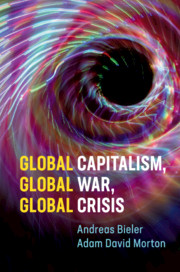Book contents
- Global Capitalism, Global War, Global Crisis
- Global Capitalism, Global War, Global Crisis
- Copyright page
- Dedication
- Contents
- Tables
- Figures
- Acknowledgements
- Abbreviations
- Introduction
- Part I Conceptual Reflections
- Part II Thematic Considerations
- Part III Empirical Interventions
- Conclusion
- Bibliography
- Index
1 - A Necessarily Historical Materialist Moment
from Introduction
Published online by Cambridge University Press: 30 April 2018
- Global Capitalism, Global War, Global Crisis
- Global Capitalism, Global War, Global Crisis
- Copyright page
- Dedication
- Contents
- Tables
- Figures
- Acknowledgements
- Abbreviations
- Introduction
- Part I Conceptual Reflections
- Part II Thematic Considerations
- Part III Empirical Interventions
- Conclusion
- Bibliography
- Index
Summary
The global political economy is currently undergoing unparalleled change. Emerging economies around Brazil, Russia, India, China and South Africa (the BRICS) challenge the assumed historically dominant and advanced position of Western capitalist states. Especially China, it seems, is potentially on course to ‘catch up’ developmentally and overtake even the United States. China was the world's leading exporter in 2014, exporting goods valued at a total of $2,342.31 billion USD. In second place, the United States exported only 69 per cent of this amount, followed by Germany in third place with 64 per cent of Chinese exports. Chinese ascendancy is also reflected in impressive economic growth rates. Double-digit GDP growth rates during the mid-1990s and then again in the mid-2000s culminated in an increase of 14.2 per cent in 2007. The figures have declined since, due to the global economic crisis, but are still comparatively high at around 7 per cent today. GDP growth in the United States, by comparison, was between 4.1 per cent (at its highest increase) and –2.8 per cent (at its lowest) across the period of 2000 to 2015. Indian growth rates of around 8 per cent since 2000 come closest to China among the BRICS, while the performances of Brazil, Russia and South Africa are more varied and clearly at a lower level.
Will it be feasible to integrate these states harmoniously into the global political economy, or are we likely to witness further interstate and global conditions of war between hegemonic rivals such as the United States and key contender states such as China? In many respects, we are already in a period of sustained war with the global ‘war on terror’ engulfing ever more countries stretching from Afghanistan and Iraq, ranging via Libya to encompass and destabilise the whole region around Syria. Of course, the global ‘war on terror’ does not simply unfold in ‘peripheral’ spaces but is again and again also waged in the heartland of global capitalism with terror attacks in Paris in November 2015 and Brussels in March 2016 being just two recent horrendous moments.
- Type
- Chapter
- Information
- Global Capitalism, Global War, Global Crisis , pp. 3 - 24Publisher: Cambridge University PressPrint publication year: 2018



